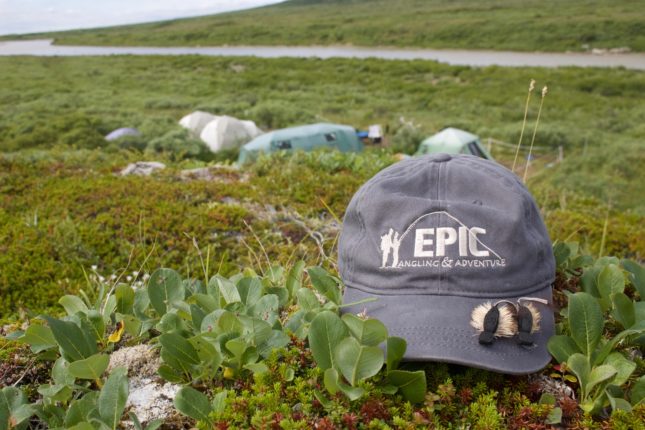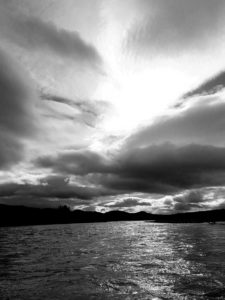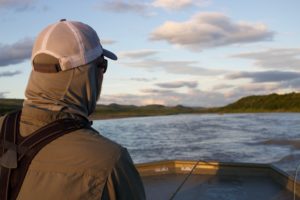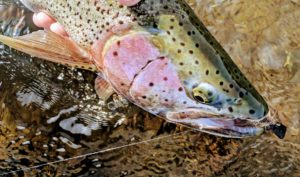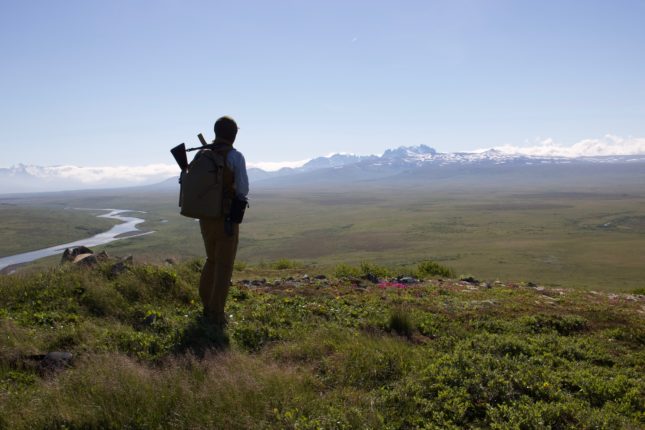Epic Blog
Until Next Time
05.29.20
There was little to be surprised by when I received the email from Rus earlier this month. I knew before opening it what it meant; that our Outpost camp would be canceled due to Covid-19. I had been anticipating the news for some time. It wasn’t a full cancellation of the season. There is still a sliver of hope that something might be salvaged, but it was now definitively clear that the picture of how I would spend my summer on the remote Alaska Peninsula was no more.
It seems that nearly every aspect of life has been uprooted by the arrival of this virus, and for us fishing guides this has been especially disruptive to our seasonal work. In our profession we are always at the whim of mother nature, and this has been a sobering reminder of just how much sway she can have over the lives of all of us.
I had my doubts about the prospects of our season before the ax officially fell, but I wanted to stay optimistic in the face of what seemed inevitable. Maybe that was the fisherman in me. Always hoping that there will be a better day on the water than the one that came before. A better cast. A better bend around the next corner. A better hatch in the evening. The fish of a lifetime sitting in the next run. Hope springs eternal for the consummate angler, and the more things you can look at through the lens of an angler surveying a piece of water, the better you will be at seeing the best of things during the worst of times. This is not to say that the news wasn’t a let down. It felt like a huge part of my life had just evaporated overnight. Suddenly I was confronted with the reality of all the things I wouldn’t get to experience for the first time in three years of working for EPIC Angling & Adventure. They say you never know how much something means to you until it’s gone, and if you’ve spent time with us up in the far north of remote Alaska this will especially resonate for you.
I think of life at our Outpost camp, a life of ceaseless activity. Days that seem to stretch on and on under the nightless sky of Alaska in early summer. It is never as lush a landscape as when we first arrive at our camp, but just to step foot on that tundra we must undergo a journey that is in itself an odyssey. Culminating in a hard day’s boat ride that begins in the predawn hours underneath the matte grey sky of Bristol Bay, the town of Egegik still asleep across the miles wide delta, save for a few of the commercial fisherman up early to reset their nets during the incoming tide. I’ve seen Beluga Whales show themselves on trips through that estuary, before we enter the lower stretches of the King Salmon River. Their white bodies breaking the muddy surface of the bay, hunting the salmon that have just begun to flood in from the sea in anticipation of their spawning run. At some point on the journey up river the sky breaks open. To peer upwards from the bow of the boat you can see for yourself why they call this the weather factory of the world. A kaleidoscopic array of clouds seem to crash into one another as if literally mixing on the pitched roof of the world. Always to the west, towards Bristol Bay, a resolute dark band of impending bad weather marks the place where the North American continent ends.
The boat is loaded from bow to stern with all things imaginable. Landscaping tools, fuel jugs, tables, chairs, tents, more dry bags than you can fathom and of course an arsenal of fly rods. It’s a mountain of gear piled high at mid-ship, making us look more like a miniature barge than a jet boat. The river bends and breaks a hundred times. The drone of the outboard breaking the day’s serenity, flushing Mallards and Mergansers alike. Stirring the kite-shaped Arctic Terns from their hidden nests as they swoop down upon us in retaliation for disturbing the peace. Finally, we can see the lilting back of Sleeping Bear, rising four hundred feet from the tundra. Beyond it the saw toothed peaks of the Aleutian Range cutting a jagged silhouette against the afternoon sky. Now we are nearly there.
The hard part is over. No matter what happens now we have made it to our camp. That’s how it feels anyways, like breathing a sigh of deep relief. Now all that is left to do is to turn all of the assorted gear we’ve hauled with us into a camp. It happens within the span of three or four days. A tent or two pops up a day at a time, like sprouting daisies in a spring field. It’s a simple home in the end. A far-flung Outpost notched out of the willow mazes and alder thickets that dominate the lowlands along the banks of the big river. Behind us an imposing ridge that stretches for miles as it parallels the King Salmon. Below us a meandering pathway descending to the gravel bar and the banks of a river, which often runs turbid and muddy from glacial melt during the summer months. Our reason for being here lays behind us. 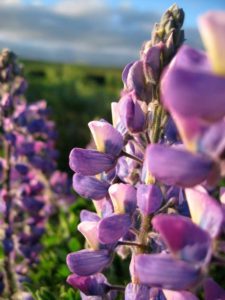 Beyond the high ridge that looms over our camp and across a mile of verdant tundra that is in full bloom. The vista stretches before us like a sea of coral. Sprawling in every direction is an Elysian Field of rolling green land that flushes purples and violets with Nootka Lupine and Fireweed. All around the intoxicating aroma of Labrador Tea permeates the air. It’s a glimpse of Eden, until you start walking over it. Tundra walking is hard walking. Imagine walking on huge pieces of a sponge laid over a field laden with dynamite that someone lit the fuse to. To go a mile feels like you went five, but it’s worth it. No matter how hard the march it is always worth it. After you hump over that last mogul and see the creek gently flowing through the landscape of open tundra you quickly forget your tired legs and heavy pack. Below is an angler’s dream. The perfect sized creek for the fly fisherman, full of eager and hungry fish, set in a desolation of endless wilderness. It’s there for you and for you alone. We seldom see signs of other people on the banks of the creek, and in the three years I’ve guided at Outpost I have never seen another party or individual fishing the water we fish.
Beyond the high ridge that looms over our camp and across a mile of verdant tundra that is in full bloom. The vista stretches before us like a sea of coral. Sprawling in every direction is an Elysian Field of rolling green land that flushes purples and violets with Nootka Lupine and Fireweed. All around the intoxicating aroma of Labrador Tea permeates the air. It’s a glimpse of Eden, until you start walking over it. Tundra walking is hard walking. Imagine walking on huge pieces of a sponge laid over a field laden with dynamite that someone lit the fuse to. To go a mile feels like you went five, but it’s worth it. No matter how hard the march it is always worth it. After you hump over that last mogul and see the creek gently flowing through the landscape of open tundra you quickly forget your tired legs and heavy pack. Below is an angler’s dream. The perfect sized creek for the fly fisherman, full of eager and hungry fish, set in a desolation of endless wilderness. It’s there for you and for you alone. We seldom see signs of other people on the banks of the creek, and in the three years I’ve guided at Outpost I have never seen another party or individual fishing the water we fish.
Not this year though, not for the first time in a long time. There won’t be any long hikes across the tundra or expeditions up to the top of Sleeping Bear. No journey up river in the jet boat. No afternoon BBQ’s on Wednesdays and Fridays. No waiting in eager anticipation for the sound of clients arriving on Saturdays. No days back in camp. No trips to the cold water spring to collect drinking water. No ice baths in the river after a sweltering afternoon hike. No playing washers down on the gravel bar after dinner. No ice cold tundra beers. No rainbow trout eating mice. No firetruck red king salmon. No hard hitting chums. No streamer junky Dolly Varden. No dry fly rising grayling.
It’s a hard thing to let go of. Once you’ve been there and experienced it you have a difficult time imagining not being able to do it again. To see it all again. Now it’s all confined to the realm of memory. A memory of something that when recalled seems dreamlike, like something belonging to another life. A story you were told once.
There’s a momentary sadness at being unable to relive those experiences, to build upon them and forge new ones.
Then I think of the place again. The vastness of it. It’s wildness. All of the things that make it so vivid and exceptional in my memory. I realize how in our absence what is left is a place that is as wild as the day it was made. I think of riffles teaming with an ancient lineage of perfect rainbow trout. I think of the deep bends that stack up with migrating king salmon like a flotilla of red Zeppelins waiting for the cover of evening to move further up river and how only the eyes of other animals will see them there. The lament of the golden crown sparrow will be heard by no one save for the roaming brown bear who ambles across the open tundra snacking on berries and hoping to sniff out an unlucky Arctic ground squirrel. I think of all those Lupine blooming amongst the moss and lichen of the tundra, and how no one will walk through them on their way to the river. There’s a comfort in that thought, a respite from the constant anxiety that has come with this time of great uncertainty due to the virus and the upheaval it has created. I still wish I could go there, but in the meantime I can envision a paradise left to itself, waiting for us to remember it again.
Drew Griffith (aka “Machete”). May 2020
Find more Machete articles here.
Posted in All Posts, Guide Journal

